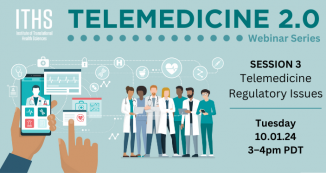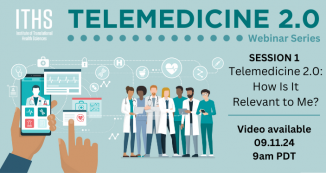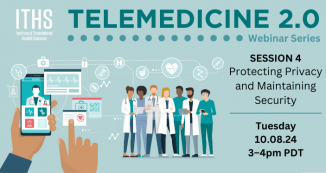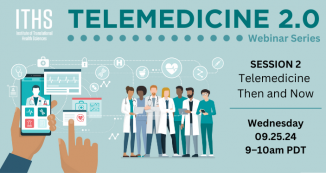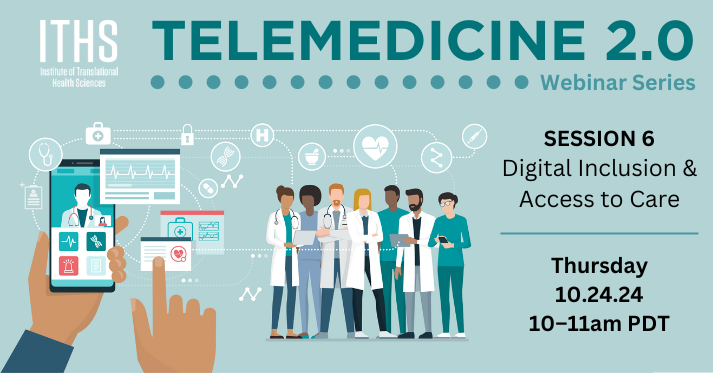
16 Aug Digital Inclusion and Access to Care by Telemedicine
Register below to receive Zoom link
Event Video
Description
Telemedicine offers all the advantages, and navigates all the issues, of wireless and cellular-based technologies. Are we creating yet another digital divide? Attend this session to learn about ways to improve telemedicine access for all patients and the measures supporting inclusive intentions in healthcare.
The Telemedicine 2.0 series offers inter-disciplinary insights into telemedicine practice and development of its supporting technologies with consideration for the associated regulatory, data security, and patient privacy issues. This free online series will be hosted in six parts (one pre-recorded and five live sessions) in September and October. One registration will give you access to the all of the sessions.
Event Materials
5 MBSLIDE PRESENTATION: Digital Inclusion and Access to Care by TelemedicineSeries Learning Objectives
Upon completion of this program, participants will be able to:
- Identify opportunities to improve remote patient care
- Identify security and privacy risks associated with telemedicine technologies
- Mitigate introduction of disparities in access to clinical care
Sessions
- Telemedicine 2.0: How Is It Relevant to Me? (Pre-recorded video posted above 09.11.24)
- Telehealth Then and Now (09.25.24, 9–10am PDT)
- Telemedicine Regulatory Issues: Licensing, Standards of Practice, Billing, and Reimbursement (10.01.24, 3–4pm PDT)
- Protecting Privacy and Maintaining Security in Telemedicine (10.08.24, 3–4pm PDT)
- The Entrepreneur’s Perspective on Telemedicine Technology and Tools Development (10.15.24, 3–4pm PDT)
- Digital Inclusion and Access to Care by Telemedicine (10.24.24, 10–11am PDT)
About the Speakers
 John Scott, MD, MSc, FIDSA, is a Professor of Medicine (Division of Allergy and Infectious Diseases) and Chief Digital Health Officer at UW Medicine. He graduated from Stanford University with a degree in Human Biology, attended Georgetown University School of Medicine cum laude, completed a residency in Internal Medicine at Stanford University Hospitals, and then obtained sub-specialty training in Infectious Diseases at the University of Washington. He joined the University of Washington faculty in 2005.
John Scott, MD, MSc, FIDSA, is a Professor of Medicine (Division of Allergy and Infectious Diseases) and Chief Digital Health Officer at UW Medicine. He graduated from Stanford University with a degree in Human Biology, attended Georgetown University School of Medicine cum laude, completed a residency in Internal Medicine at Stanford University Hospitals, and then obtained sub-specialty training in Infectious Diseases at the University of Washington. He joined the University of Washington faculty in 2005.
In 2009, he launched Project ECHO (Extension for Community Health Outcomes) in Washington State, the first place to replicate the ECHO model outside of New Mexico. This innovative telehealth program helps clinicians serving in rural and underserved areas with the evaluation and treatment of common, complex, chronic diseases. In 2015, he won the Warren Reid Award for excellence in health care for the state of Washington, in recognition of his telehealth work. He chairs the Washington State Telehealth Collaborative and served on the Telehealth committee for the Infectious Disease Society of America. The Washington State Medical Association recognized him with the Grassroots Advocate Award in 2020 for his work in advocating for policy changes for telemedicine at the state and federal level.
In his role as Chief Digital Health Officer, he is focused on Virtual Care Delivery and developing a robust Digital Front Door to bring together UW Medicine’s existing technologies, apps, and other digital services into a simple, single sign-on platform.
 Cindy Jacobs, RN, JD, brings over 30 years of combined legal and health care experience to her role as a regulatory consultant with the ITHS Technology Development Center. As a registered nurse before attending law school, she focused on the clinical specialty of neonatology, including 3 years in an advanced practice role. As an attorney, she has represented and advised health care clients regarding a variety of issues, including telemedicine and other health care technologies, FDA law, HIPAA, reimbursement and related compliance, health care contracting, risk management/professional liability, scope of practice/licensing, informed consent, and product liability. Cindy’s UW roles have included Assistant Attorney General in the UW Attorney General’s Office, Director of Clinical Risk Management for UW Medical Center, and Director of Clinical Projects for the UW School of Medicine. She also continues to teach FDA Law at UW School of Law, which she has done since 2010, along with periodic law student seminars on telemedicine and healthcare clinical compliance. She is a member of the ITHS Drug and Device Advisory Committee.
Cindy Jacobs, RN, JD, brings over 30 years of combined legal and health care experience to her role as a regulatory consultant with the ITHS Technology Development Center. As a registered nurse before attending law school, she focused on the clinical specialty of neonatology, including 3 years in an advanced practice role. As an attorney, she has represented and advised health care clients regarding a variety of issues, including telemedicine and other health care technologies, FDA law, HIPAA, reimbursement and related compliance, health care contracting, risk management/professional liability, scope of practice/licensing, informed consent, and product liability. Cindy’s UW roles have included Assistant Attorney General in the UW Attorney General’s Office, Director of Clinical Risk Management for UW Medical Center, and Director of Clinical Projects for the UW School of Medicine. She also continues to teach FDA Law at UW School of Law, which she has done since 2010, along with periodic law student seminars on telemedicine and healthcare clinical compliance. She is a member of the ITHS Drug and Device Advisory Committee.
 Charlie Gregor, MPH, is the manager of the Hub Liaison Team and the Network Capacity Component of the ITHS. Charlie has held positions in non-profit, hospital, non-academic and academic research settings, bringing significant experience in business, project and clinical trial management. Following a decade in business administration and completing a master’s in public health from the University of Minnesota, where he focused on infectious disease studies and epidemiology, he subsequently progressed through research related positions. He developed a research site assessment program, expanding US FDA regulated HIV research to Southern and Eastern Africa, sat on the Steering Committee for the Rapid Acceleration of Diagnostics in Underserved Populations (RADx-UP), consortium, was the operations lead for FDA regulated domestic and international (phase 1-3) drug trials, established the first Trial Innovation Network (TIN) Hub Liaison Team at the University of Washington and has been disseminated over 15 times. Currently, Charlie is the operations lead for the Andy Hill Cancer Research Endowment funded project (RADIANT) to improve the diversity and inclusion of enrolled participates in oncology research within community based research settings and supports the UW Medicine Office of Healthcare Equity implement Washington HB 1745, requiring measures to increase the diversity of enrolled participants in drug and device trials.
Charlie Gregor, MPH, is the manager of the Hub Liaison Team and the Network Capacity Component of the ITHS. Charlie has held positions in non-profit, hospital, non-academic and academic research settings, bringing significant experience in business, project and clinical trial management. Following a decade in business administration and completing a master’s in public health from the University of Minnesota, where he focused on infectious disease studies and epidemiology, he subsequently progressed through research related positions. He developed a research site assessment program, expanding US FDA regulated HIV research to Southern and Eastern Africa, sat on the Steering Committee for the Rapid Acceleration of Diagnostics in Underserved Populations (RADx-UP), consortium, was the operations lead for FDA regulated domestic and international (phase 1-3) drug trials, established the first Trial Innovation Network (TIN) Hub Liaison Team at the University of Washington and has been disseminated over 15 times. Currently, Charlie is the operations lead for the Andy Hill Cancer Research Endowment funded project (RADIANT) to improve the diversity and inclusion of enrolled participates in oncology research within community based research settings and supports the UW Medicine Office of Healthcare Equity implement Washington HB 1745, requiring measures to increase the diversity of enrolled participants in drug and device trials.
 Jason Malone is the Director for the Human Subjects Division at the University of Washington (UW), which manages the four Institutional Review Boards (IRBs) that review and oversee UW human subjects research. Prior to serving as Director Jason was the Assistant Director for Regulatory Affairs, administering the IRB compliance and post-approval monitoring programs. Jason spent nine years as the Clinical Compliance Officer for the UW Institute of Translational Health Sciences where he ran the compliance programs for the pediatric and adult Clinical Research Centers as well as the Data and Safety Monitoring program. Before his career at the UW, Jason spent six years at Quorum Review IRB (now Advarra) where he was responsible at various times for overseeing their nationwide site monitoring program, IRB Administration, Regulatory Compliance, and Customer Relations. Jason has a master’s degree from the UW in Public Administration, and a Certificate in Global Health.
Jason Malone is the Director for the Human Subjects Division at the University of Washington (UW), which manages the four Institutional Review Boards (IRBs) that review and oversee UW human subjects research. Prior to serving as Director Jason was the Assistant Director for Regulatory Affairs, administering the IRB compliance and post-approval monitoring programs. Jason spent nine years as the Clinical Compliance Officer for the UW Institute of Translational Health Sciences where he ran the compliance programs for the pediatric and adult Clinical Research Centers as well as the Data and Safety Monitoring program. Before his career at the UW, Jason spent six years at Quorum Review IRB (now Advarra) where he was responsible at various times for overseeing their nationwide site monitoring program, IRB Administration, Regulatory Compliance, and Customer Relations. Jason has a master’s degree from the UW in Public Administration, and a Certificate in Global Health.
Please sign in below to access this form.
Access to this form is restricted to ITHS Members. Please sign in, or create an account.




